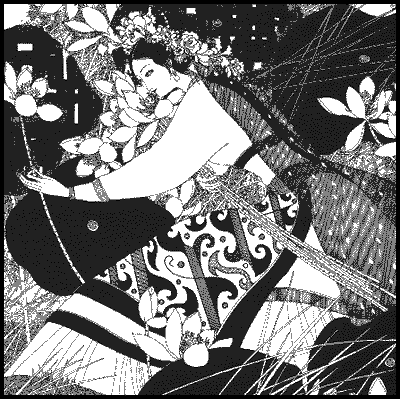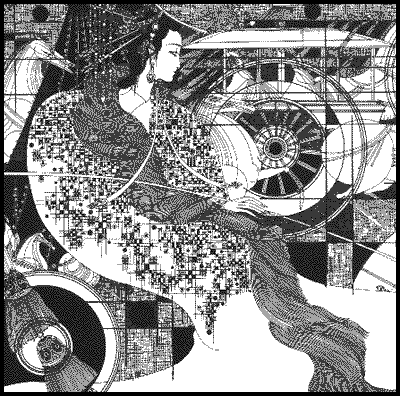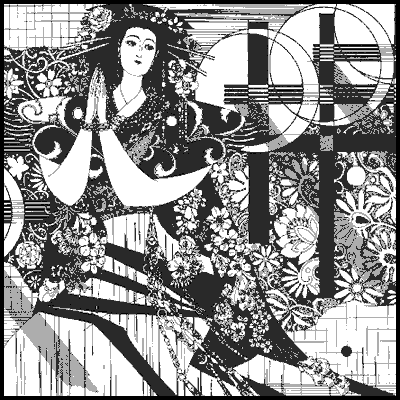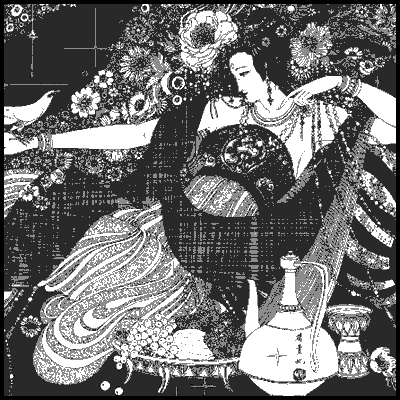The four most beautiful women in
the ancient China:
 Xishi
Xishi
Xishi (497 BC) was a legendary beauty of ancient China. She has been described as
"equally charming in both heavy and light makeup", "as appealing when she
frowns as when she smiles". Of her figure it has been said that "were she plump,
you would admire her plumpness, were she thin you would admire her for being
slender". She is celebrated as a woman of extraordinary natural beauty with a
universal appeal. Although many have praised Xishi's looks, there is but little mention of
her notable virtue - she had a great love for her country and her people.
Xishi was the daughter of a tea trader from Ningluo Mountain village in the Zhuji
county in Zhejiang Province. This comprised a part of the ancient state of Yue.
When the state of Yue was vanquished by the state of Wu, the King of Yue, Gou Jian was
forced to serve the Prince of Wu for three years. On his release, King Gou Jian slept on
brushwood and drank gall before each meal to remind himself of the humiliation his country
had suffered. He commissioned men to search far and wide for a woman whom he could send as
a tribute to Prince Fuchai of Wu. Xishi, whose beauty was much talked of even from early
childhood, was selected for this task and sent to the capital.
King Gou Jian approved of the choice and had Xishi dressed in fine robes. He had her
trained in royal court etiquette. Gou Jian ordered his minister Fan Li to take Xishi to
the Prince of Wu as a tribute gift from Yue. During the journey, Xishi fell deeply in love
with the wise minister. Fan Li also grew to admire this courageous lady who was willing to
give her life for her country. Consequently, before they parted, they made a secret pledge
of undying love.
They arrived at the capital of Wu and the prince welcomed Xishi with open arms. He was
enchanted by her appearance and doted on her. Gradually he began to neglect his political
duties, preferring to idle away his time with Xishi. He frequently took her out on
carriage rides to the noisy and prosperous sections of the city. On these rides, he liked
to boast to those around him that he had won the heart of the most beautiful woman in the
world. He would add: "If you want to look at her, you'll have to present me with some
gold coins!" In this way, he also managed to enrich his coffers.
Xishi, however, never lost sight of her mission. Her aim was to bewitch the Prince of
Wu so that his subjects would grow restless and his friends would desert him. The
political chaos that ensued would enable the King of Yue to invade the state of Wu,
recompensing him for his former humiliation.
Heaven grants the wishes of men. The King of Yue finally annexed the state of Wu.
Following the death of Prince Fuchai of Wu, Xishi disappeared from public life. She lived
in relative obscurity with Fan Li who became a successful trader.
This story is unique in the history of feudal China as no one has ever found fault with
Xishi, even though she had caused the downfall of the state of Wu.
 Wang Zhaojun
Wang Zhaojun
Wang Zhaojun is perhaps the best known of China's "political brides". Many
tales have been told about her life.
Her name was Jiang, her style Zhaojun but during the Jin Dynasty, she was referred to
as Minghou as the name Zhao could not be used by ordinary folks since the king, Sima Zhao
had the same surname. Later generations, however, addressed her as Mingfei.
A native of Zigui ( in Western Hubei province), she entered the imperial harem during
the reign of Emperor Yuan of Western Han (48-33 BC). The emperor chose companions from his
vast harem of maidens by looking at their portraits. As a result of this practice, it had
become the custom for palace ladies to offer large bribes to court artists to ensure that
they painted a flattering likeness. Wang Zhaojun, however, was confident of her natural
beauty and refused to pay the court painter, Mao Yanshou, his customary bribe. As a
result, from her finished portrait, she seemed to be the ugliest of all the palace ladies
and thus, never received the emperor's favour.
When the Xiongnu chieftain, Huhanxie became a subject of the Han empire, he told
Emperor Yuan: "I wish to take a Han beauty as my empress.
To cement relations with this barbarous nation, Emperor Yuan agreed to the request.
Unwilling to pick out a real beauty, the emperor ordered that the plainest girl in the
harem be selected for the marriage. When the lady-in-charge of the harem sent the
unflattering portrait of Wang Zhaojun to the emperor, he merely glanced at it and nodded
his approval.
Only when she was on the point of departure did Emperor Yuan set eyes on her. Much to
his dismay, he realised that she was in fact the loveliest woman in his harem. Emperor
Yuan was intent on finding out how such an error could have arisen. He discovered that the
blame lay with the fraudulent behaviour of the court artist Mao Yanshou so Emperor Yuan
ordered that he be put to death.
This redress, however, came too late for Wang Zhaojun. Dressed in the regalia of the
Han court, clutching her Pipa to her bosom, she travelled beyond the Great Wall. Wang
Zhaojun never returned and died in a distant barbarous land. There is a rich and poignant
poem entitled Song of Mingfei:
"When Mingfei left the palace of Han,
Face damp with tears, hair hanging loose,
Turning her lowered head she gazed back, expressionless.
And her sovereign could not restrain his anguish.
Blame lay in an artist's hand,
Few had he seen so pleasing to the eye.
Yet the source of such beauty was not painted;
Mao Yanshou was killed at once.
Departing, she knew, never to return,
Pitiable in the costume of the Han court.
Her plaintive voice asking for news of the south.
Where only the swan geese flew and returned each year.
Messages sent by her family, ten thousand li,
So that she in the foreign land will not pine.
Close by, Chang'an gate has locked out the beauty,
Life's aspirations thwarted by neither north nor south.
 Diaochan
Diaochan
Diaochan, whose name is not to be found in official history books, plays an important
role in the Romance Of The Three Kingdoms. Her story, which is still well-known today,
tells how two allies were so blinded by a pretty woman that they became enemies, one
intent on destroying the other.
The events of this tale took place during Dong Zhuo's monopolisation of power. One day,
during a palace banquet, Dong Zhuo levelled false accusations against Situ Zhangwen, an
official. All the eminent officials who had gathered for the feast watched in horror as
Situ Zhangwen was dragged outside to be beheaded. Each man feared that the fate of the Han
duke might well be his own.
When Prime Minister Wangyun returned to his residence, he was so disturbed by what he
had seen at the palace that he was unable to sleep. He went for a stroll in the garden.
Suddenly, he heard someone praying. The sound seemed to have come from behind a clump of
peony trees. Stepping over to investigate, Wangyun realised that it was Diaochan, a
singing girl from his own household.
Diaochan had come to the Wang mansion as a young child and Wangyun had looked upon her
almost as if she were his own daughter. He asked her: "What are you doing here in the
middle of the night?"
She answered him: "From early childhood, I have benefitted from your kindness and
have often wondered how I may one day repay you. Recently you have been so sad and
despondent; yet I do not know how to alleviate your suffering. That is why I am sighing.
Please tell me how I can help you. I will do whatever I can while I still have the
strength!"
Wangyun led Diaochan into an inner room and, having dismissed the servants, went down
on his knees before her. Shocked and flustered, Diaochan begged to know what was troubling
him. Wangyun spoke to her earnestly: "Our country is in great peril. I think you may
be our only salvation. The despot Dong Zhuo wants to see himself enthroned as the Son of
Heaven while the court officials can only look on helplessly. I have a plan to end his
scheming. With your wit and charm we may be able to drive a wedge between Dong Zhuo and
his adopted son Lü Bu. If we can end their alliance, and cause them to fight against each
other, we may be able to eliminate them both."
Diaochan agreed at once to do her best. Wangyun took the earliest opportunity to
betroth Diaochan to Lü Bu; at the same time presenting her to Dong Zhuo as a concubine.
Both Dong Zhuo and Lu Bu became fond of her and could not decide how to settle the matter.
As the hostilities grew, Diaochan took every opportunity to add fuel to the fire and the
two men became fiercely jealous of each other. Eventually, Wangyun was able to gain Lü
Bu's assistance in assassinating Dong Zhuo.
Unfortunately, soon after, both Wangyun and Diaochan were put to death by surviving
members of Dong Zhuo's clique.
 Yang Guifei
Yang Guifei
"Appreciating feminine charms,
The Han emperor sought a great beauty.
Throughout his empire he searched
For many years without success.
Then a daughter of the Yang family
Matured to womanhood.
Since she was secluded in her chamber,
None outside had seen her."
Yang Yuhuan, later to become Yang Guifei (AD 713-756), was the daughter of Yang
Xuanyan, a census official in Sichuan.
An only child who lost her father early in life, Yang Yuhuan was raised in the
household of her uncle, Yang Xuangui. She grew up to be one of the few women whose beauty
has caused the downfall of monarchs and nations.
"Yet with such beauty bestowed by fate,
How could she remain unknown!
One day she was chosen
To attend to the emperor.
Glancing back and smiling,
She revealed a hundred charms.
All the powdered ladies of the six palaces
At once seemed dull and colourless.
One cold spring day she was ordered
To bathe in the Huaqing Palace baths.
The warm water slipped down
Her glistening jade-like body.
When her maids helped her rise,
She looked so frail and lovely,
Immediately winning the emperor's favour."
In the twenty-second year of the Kaiyuan reign, Yang Yuhuan was chosen to enter the
imperial harem. In the twenty-eighth year, the Tang Emperor Xuanzong summoned her to the
Huaqing Palace where she first rose to imperial favour.
"Her hair like a cloud,
Her face like a flower,
A gold hair-pin adorning her tresses.
Behind the warm lotus-flower curtain,
They took their pleasures in the spring night.
Regretting only the spring nights were too short;
Rising only when the sun was high;
He stopped attending court sessions
In the early morning.
Constantly she amused and feasted with him,
Accompanying him on his spring outings,
Spending all the nights with him.
Though many beauties were in the palace,
More than three thousand of them,
All his favours were centered on her."
Her relatives gained unprecedented influence: her uncle, Xuangui, was made a senior
official in the capital; her cousin Yang Guozhong was appointed prime minister; her elder
brother, Yangxian became an official of the second rank while her younger brother, Yangqi
was given an imperial consort as his wife. Her sisters were all appointed to nobility.
"The Rainbow and Feather Garments Dance
Was stopped by the sounds of war.
Dust filled the high-towered capital,
As thousands of carriages and horsemen
Fled to the south-west."
Emperor Xuanzong, wallowing in the pleasures of the flesh, neglected his court and
politics. In AD 755, An Lushan, a powerful general, seized the opportunity to stage a
rebellion and marched into the capital. Emperor Xuanzong fled towards the south- west,
taking Yang Guifei with him.
"The emperor's green-canopied carriage
Was forced to halt,
Having left the west city gate
More than a hundred li.
There was nothing the emperor could do,
At the army's refusal to proceed.
So she with the moth-like eyebrows
Was killed before his horses.
Her floral-patterned gilded box
Fell to the ground, abandoned and unwanted,
Like her jade hair-pin
With the gold sparrow and green feathers."
They had not gone far from the capital when the soldiers refused to go on, demanding
the death of Yang Guifei. Emperor Xuanzong had no choice but to watch Yang Guifei kill
herself at the slopes of Mawei village.
Like the soldiers, the common people hated Yang Guifei, believing that she had brought
harm to their country. In reality, she was no more than the plaything of a fatuous
monarch, used as an excuse by treacherous subjects to justify sedition. Perhaps those who
truly deserve to be despised are the self-indulgent emperor, his traitorous subjects, and
fair-weather friends who used claims of kinship to gain power. Beyond that, the blame must
lie with the backward system of feudal autocracy under which Yang Guifei lived.
"Heaven and earth may not last for ever,
But this sorrow is eternal."
(Source: span.com.au)